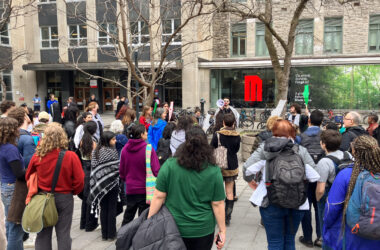The McGill administration is currently considering a number of changes to the university’s academic calendar, including a proposal to shorten the lengths of the fall and winter semesters by reducing the number of hours students are in contact with their professors.
Standard McGill classes currently give students three hours of contact with instructors per week for 13 weeks, for a total of 39 hours per semester. The proposal, which is being considered by the Working Group on Calendars and Dates, a subgroup of McGill Senate’s Committee on Enrolment and Student Affairs, would reduce the required number of contact hours to 36 per semester.
Students’ Society Vice-President University Affairs Joshua Abaki has pushed for the changes, arguing that McGill students must work harder than their peers at other universities. According to Abaki, McGill is the only member of the G-13—a group of research-focused universities in Canada—that requires 39 hours.
“Our students are actually putting in way more time than students at other universities,” Abaki said.
According to Deputy Provost (Student Life and Learning) Morton Mendelson, however, the length of a semester actually varies more considerably. Some universities in the United States, he said, require 42 or 45 contact hours per semester.
While discussions of the proposed changes are still in the preliminary stages, the working group is considering a number of options, Abaki said.
“Students have asked for different things. One of the possibilities is [to] introduce a reading week during the fall semester, [which] would probably coincide with Thanksgiving break,” he said. “The other possibility is [to] increase the number of days between the last day of classes and the beginning of exams for both semesters.”
A third proposal is to lengthen McGill’s December break, which Abaki said would benefit international students who travel long distances to go home.
“Compared to other Canadian and G-13 universities, our exam period is way longer,” Abaki said. “Most universities complete their exams within two weeks, and ours normally stretches to almost three weeks.”
Such changes create tradeoffs, however. Shortening the exam period might mean students would have to take evening or weekend exams.
Any effort to reduce the number of contact hours would require extensive consultation between the administration and the university’s many departments and faculties. “There are many problems with reducing the semester to 36 contact hours,” Mendelson said, “not the least of which are concerns that some of the faculties have with accreditation.”
The Faculties of Engineering, Law, and Medicine are each accredited by various professional organizations, which require them to teach certain material. Changes to the academic calendar could force professors to pack the required information into a shorter period of time.
Because of these problems, Mendelson thought it was unlikely that the working group would recommend major changes.
“I haven’t received a final report from the work group,” he said, “but I would be very surprised if it would actually make a firm recommendation to go to fewer contact hours.”
If changes are implemented, said Annie Ma, a student senator from the Faculty of Science and a member of the working group, they will probably not occur until several years from now—possibly not until 2014-15.
Abaki, however, stressed his optimism that the working group will move forward with the changes, even though more student consultation will be required.
“They are definitely considering it seriously,” he said.








